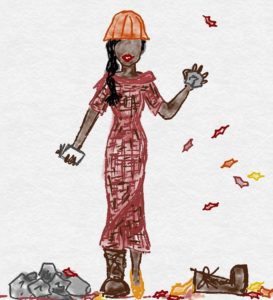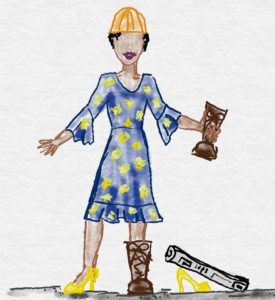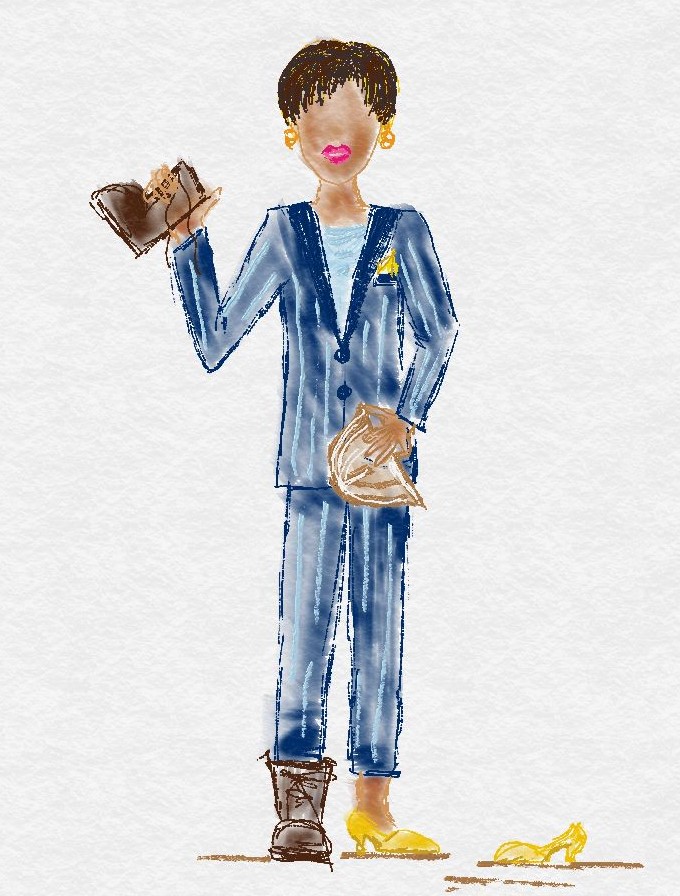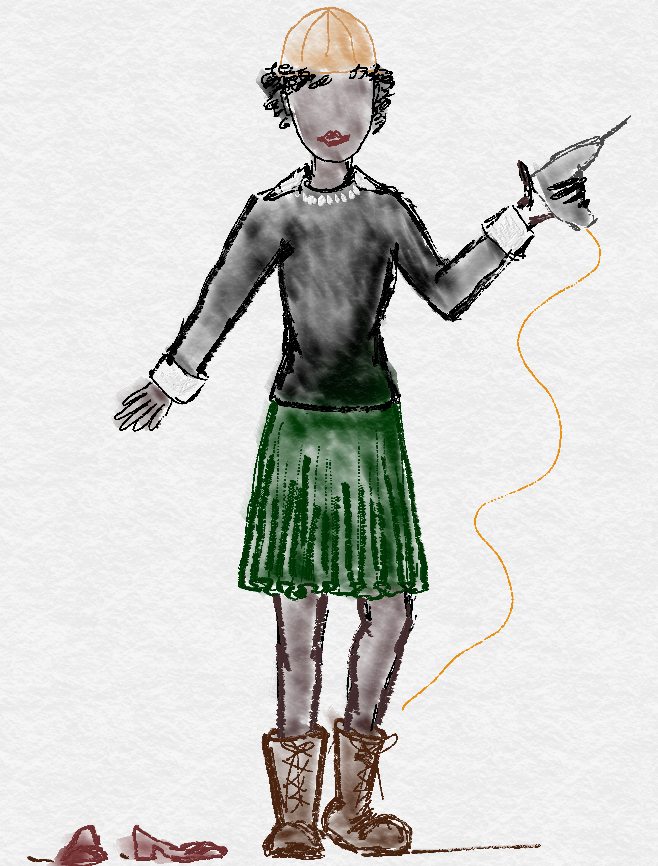Peggy Hagerty Duffy
I Can Do That
My Favorite Things

Early summer brings many of my favorite things. I get to visit the local nursery and spend way too much money on every annual flower that catches my eye. Lunches, dinners, cocktails, brunches, and even afternoon coffee take place outside on patios, piazzas, decks, and sidewalks. And sundresses and espadrilles are parts of a daily uniform.
But one of my absolute favorite early summer occurrences is the annual emergence of young, eager new male construction workers on all my jobsites. Wait – did I just say male workers? Is this going to be the start of a new, lecherous, politically incorrect phase in the life of Underpinnings? As interesting as that sounds (and lucrative), alas, the truth is much simpler and more wholesome.
Every year, young men everywhere graduate from high school and follow their fathers and uncles and grandfathers and mothers along a natural path into a wide variety of construction trades. These guys usually, if not always, are amazing examples of self-confidence and enthusiasm. They volunteer for every task. They say, “I can do that” with unabashed ease. They take pride in outlifting and outdigging and outworking everyone around them. And they eat everything in sight, constantly talking about and thinking about food.
(There might be some girls who enter the construction field when they graduate from high school, but I haven’t run into them on my jobsites. And I would bet that those few that are out there, somewhere, don’t have the ten-feet-tall-and-bulletproof attitude of their male counterparts).
Of course they have their obstacles. The older guys hide their tools. The jaded, experienced workers scoff at their swagger and interject a thousand cynical retorts for every ambitious proclamation. And the young guys’ inexperience and hubris often trips them up as they try to climb to the top in 20 seconds.
Regardless of their faults, I love these guys. I am in awe of their complete lack of angst. They don’t worry about letting anyone down. They don’t agonize about whether or not they can handle their jobs. They don’t overanalyze every co-worker’s words to determine if anyone is secretly disappointed in their performances or upset with them. And I think it goes without saying that any sane person would envy the ability to down three sausage egg biscuits and be hungry 30 minutes later.
Conversely, I have noticed that most women, when entering a new position or moving up into a new role, proceed at a much more cautious pace. We worry that we’re not smart enough or efficient enough or resourceful enough to do our jobs. The normally low buzz of panic and self-doubt that is the background music in our brains swells to a roar of incessant trepidation. Instead of being thrilled to have a new opportunity, we’re scared. We don’t need obstacles to crop up; we imagine them and spend all of our time dodging their looming specters in our brains.
The role of biology might have a partial role in this gender difference, particularly for women who are in male-dominated fields. We have the responsibility to nurture and protect our offspring, so we have to be a little less damn-the-torpedoes in our approach to life. We also have to be careful in a world where we’re typically smaller and weaker than the opposite sex.
My older brother would say that this natural caution is not natural at all, because he believes that there is no nature in the nature versus nurture debate, only nurture. His theory is that men and women would behave exactly the same if they were treated identically from birth. I don’t agree with him, but many people do. I believe that biology is part of the equation, but social development contributes as well. And maybe that’s where we can advance. A little bit of evolution in how we raise our daughters could produce a little less angst and a little more “I can do that!” We can do so many great things when we think about our jobs in terms of opportunity rather than potential failure.
My best friend (we’ll call her Environmental Girl, or EG for short) is a great example of how far a woman can go when she doesn’t hold herself back. A number of years ago, her company successfully bid on an environmental remediation project at an abandoned army airfield on an island in the middle of the Pacific Ocean populated only by endangered birds. (The blue footed booby frequently holds raves on the airstrip). The project would last several months, and the crew would travel to the island and stay there for the duration. No TV or radio, and hot coffee only when there was enough generator time available. EG said, “I want to go!”
This might seem bold, but it was particularly fearless given that her youngest daughter would be only 5 months old when the project would start. What??????
Many, many people said she was crazy. Her mother told her she was going straight to hell and she would need any profit from the job to pay for her infant daughter’s inevitable astronomical therapy costs when she got older. Female colleagues expressed shock and ran home to embrace their kids. But besides the fact that EG’s husband was a completely capable caregiver, as were her other 142 kids who all lived at home, the project only spanned a short time period. And it was a fabulous, once-in-a-lifetime opportunity! So she said yes, and she went. Damn more than the torpedoes – damn the whole fleet.
The experience was phenomenal, and EG learned things about herself she never would have otherwise. I am pleased to report that the endangered infant has grown into a daring chip off the adventurous old block, and she might be inclined to take on a project in the middle of the Pacific or take a position as chief of staff for the president of an international company and never doubt herself. When we doubt ourselves and hesitate to take chances and always put ourselves last, we teach our daughters to do the same. When we go after what we want and trust ourselves to be enough, we increase the chances that they will succeed.
Not every situation warrants a fearless attitude. Caution has its place. But self-confidence shouldn’t be an unknown quantity to women in the work world. We shouldn’t spend our time worrying about what we might do wrong, we should envision how high we can fly. Repeat after me – I can do that!
How Did You Get Here?
Diluting Workforce Quality for the Better…Or Not

How did you get where you are? No, I’m not referring to your route to work this morning or whether you took a plane or a train to get to the conference you’re attending or how you managed to sneak out of the office to go shoe shopping. (But bravo to you, and find me some of those cute Jeffrey Campbell mules, would you?) How did you achieve your position? Was it years and years of 80-hour weeks and steady promotions? Did you take advantage of an equal opportunity hiring program? Or did you poison your previous supervisor? Don’t worry – there are no right answers here.
A friend of mine who works for a large company recently told me that her engineering manager decided the company needs more female engineers. She then was told that a recent hire of that very gender would be joining her group and would report directly to my friend. Hooray, right? Do that girl power cheer right there at your desk (or in front of the Manolo Blahnik display). This could be considered particularly good news given that my friend is quite the glass ceiling breaking pioneer herself. But, alas, her expression as she relayed the news didn’t hint at any joy. In fact, she was downright moribund.
After I persuaded her that tomorrow was another day and those Yankees can’t hurt us anymore*, she explained that the new hire was less than sterling. In fact, she was difficult to work with, defensive, unresourceful, and prickly. These characteristics had revealed themselves in short order as soon as the new employee had started work. In fact, administrative personnel even had complained about her. And now my friend was tasked with molding this young professional into a productive and valuable team member. Have you ever tried to mold brick? My friend was understandably torn between wanting to advocate more women in technical positions and envisioning numerous scenarios in which a freak act of nature demolished the company building and her new hire was the only unfortunate casualty.
This situation highlights the always pertinent question of whether equal opportunity programs are a help or a hindrance. It is an intensely complicated issue, and the answer varies significantly based on the year and the location.
Many years ago, highly qualified (and pleasant) women and minorities didn’t have the opportunity to even apply for many jobs, particularly positions in technical fields. There was no question of unqualified applicants slipping through the system because most women and minorities couldn’t even get close to the system. Applying for a job was almost a humorous proposition.
A prime example is a very prominent geo-structural engineer who applied for a position at a consulting firm in the early 1970s when she graduated from engineering school. She reported to the firm’s office and chatted with the principal engineer for a short time about the company and what type of work the firm did. As lunch approached, he apologized profusely and said a job emergency had come up and that his secretary would be taking her to lunch. The young engineer happily went to lunch, not knowing whether such an occurrence was normal or not. When she returned to the office, the boss found her, apologized again, and said it was time to talk about her desired position. He then led off by asking how many words a minute she typed. “Excuse me?” she said, confused. “I don’t really know.” He was appalled that she didn’t know and asked how she possibly could expect to get a job without being able to present her credentials. She timidly inquired how typing would figure into an engineering job, which brought the boss up short. “You’re here for an engineering job??? But you’re a…I mean…Are you serious?” Rest assured our outstanding young engineer left that interview and went on to do quite fabulous things. She still doesn’t know how many words a minute she types.
In such an environment, it was necessary to pave the way to allow women and minorities a chance at, well, a chance. I can say from personal experience that the interviewing environment is not so harsh today, and it wasn’t even that awful 15 years ago.
So the initial barrier has been broken. Does that mean we still need help? Are equal opportunity programs, both formal and informal, necessary? Or are we now setting ourselves backwards by forcing unqualified applicants into the pool in the name of equal numbers? Even worse, are we creating doubt about even the qualified candidates by diluting the quality of the overall disadvantaged workforce? The answer is nowhere near easy.
Of course you could say that there are plenty of sub-par and unpleasant representatives of the white male workforce, so why should we be any different? Maybe we shouldn’t be. In fact, that’s the general idea. If the percentage of women and men in any profession correlates to the general percentage of each gender in society, both groups should have some rude, insecure idiots in most fields. But do we want to force our idiots into some roles just to balance the ranks? Or do we want to reinforce our progress by concentrating on maintaining the quality of our gender in professional positions? As I said in the beginning, there are no right answers.
It is possible that the young lady my friend will be beating managing is brittle and defensive because she has grown up in a sexist, repressed environment. She hailed from a small rural community, so maybe her original ebullient personality was dimmed by a barrage of oppression and denied opportunities. Maybe she’ll turn into a shining star of an employee once she finds security and acceptance among her peers. I’m a perpetual optimist, so I like to think this might happen to an upbeat soundtrack followed by a cygnet-to-swan montage showing her transformation into a new engineering star. This is the theory behind equal opportunity programs.
There is a stronger possibility that my friend has been saddled with her own personal albatross, and this young woman’s troubles are simply the product of really bad genes and bitter parents. Although a great job opportunity can sometimes turn a person around, it is more likely that we will soon be making an advent calendar-ish wall hanging to creatively mark the days until her inevitable termination.
The question of equal opportunity probably is one that must be determined for each specific circumstance, defying convenient sweeping conclusions. Should we throw a party someday when we can say that there are as many female idiots in engineering and construction as male idiots? (Minorities, I’m not going to speak for you, but you’re in the same boat). I’m usually first in line to plan any party, but I don’t know that I’ll be ordering the centerpieces for this one.
*In order to understand many of the references in my Underpinnings pieces, you really should be familiar with football terminology and the classics, starting with Gone with the Wind. Move on to Love Actually, The Mummy, When Harry Met Sally, and The Devil Wears Prada after that. This is the bare minimum, but I can provide a full curriculum upon request.
What Price Ambition?
Hey – Your Ambition is Showing
By Ann Schmelzer, Guest Contributor

(Editor’s Note: Ann is a top-level manager for a major international manufacturer. Someday we will all be working for her, and that’s not a bad thing. Although she is not in the deep foundations industry, she spends all day every day with men, most of them engineers. It’s no wonder her right brain takes over on the weekends, doing things like starting one of the most successful food and beverage festivals in the Midwest and coaching raging hormones girls’ soccer).
The other day I sent Peggy a screen capture of an article I was reading that made me think of her. What I subsequently learned is: Be careful what you text your friends who have a blog that is topically relevant… I’m kidding.
The article I sent was Reese Witherspoon’s recent essay in Glamour on ambition (Glamour October 2017). The screen capture itself highlighted a study that single female Harvard MBA students downplayed their career ambitions in front of male classmates for fear of possibly hurting their marriage prospects. I’m not trying to share business that isn’t mine (we’ll get to my business later), but Peggy had a dating experience in which her full life and busy schedule were questioned by an unnamed gentleman in the following way— “But don’t you want to be happy?” Dear God… what year is it? Hence, why I sent Peggy the screen capture, and hopefully a much-justified chuckle.
Reese writes an eloquent essay on the topic of ambition. The fact that she had to is somewhat saddening to me; but, at least we’re talking about it. At one point she states “Run away from a man who can’t handle your ambition. Run. So many men think ambition is awesome and sexy!” I agree Reese, but a lot of men don’t wear “I find drive emasculating” on a T-shirt to the first date. You learn that the person in question says one thing and actually wants another over time—sometimes a little time, sometimes a lot of time.
In my case, I learned it slowly– death-by-a-thousand-papercuts-style over the course of four years. In my early twenties I dated a guy who, at the time, I was very much taken with and it seemed that the feeling was mutual. He talked a great game; I mean a great game. When we talked about my career ambitions there wasn’t a whiff of hesitation in his voice. He seemed to be genuinely into my ambition.
Things eventually crashed and burned during a period of time when his career was floundering. I, by contrast, was in the middle of two masters’ degrees and a career that wasn’t floundering. I’ll spare you, dear readers of Underpinnings, all the gory details but, in hindsight, the thing that made me the angriest was that I found out he had been cheating on me with the Sunday school teacher from his family’s church. The. Sunday. School. Teacher. The cheating alone was a bitter enough pill to swallow, but the chosen partner was really the icing on the cake. Don’t get me wrong, I’m guessing she didn’t know I existed. (If she did, the irony there is on an almost incomprehensible level). Upon Monday morning quarterbacking the whole situation, it is my assumption that his need for that relationship was to shield his ego from the uncomfortable mirror I held up to his own lack of progress. Perhaps that’s me shielding my own ego from the fact that my relationship crumbled because I couldn’t pull off the perfect balancing act of non-threatening and go-getter.
The thing is that I had never hid who I was and, in the beginning, it was the greatest thing ever. By the end, the look on his face all but said “wow, you’re really like this all the time”… and not in a good way. Did he think I was lying in the early days? If I had been, wouldn’t that have been worse for everyone? These are questions not worth pondering.
So, I was the MBA-educated girl who did not tamp down her ambition. If I had, perhaps I could have nursed that relationship along for a bit but, in the end, I’m sure it would have come to a similar demise. Regardless, there are lots of different ways to interpret the Harvard study. Maybe the women being interviewed thought “What’s the harm in softening the wording here? I can still go get it done; that’s my business”; or, “These questions rarely go well for me so here is my canned response”; or, “Remember when you beat that boy in the math bowl in middle school and got uninvited to the dance on Friday?”. There are a lot of possibilities but, in the end, what a difficult commentary on the state of gender equality.
Judith Warner, who is a senior fellow at The Center for American Progress writes “Although women have outnumbered men on college campuses since 1988, they have earned at least a third of law degrees since 1980, were fully a third of medical school students by 1990, and, since 2002, have outnumbered men in earning undergraduate business degrees since 2002. They have not moved up to positions of prominence and power in America at anywhere near the rate that should have followed. In a broad range of fields, their presence in top leadership positions—as equity law partners, medical school deans, and corporate executive officers—remains stuck at a mere 10 percent to 20 percent. Their “share of voice”—the average proportion of their representation on op-ed pages and corporate boards, as TV pundits, and in Congress—is just 15 percent. In fact, it’s now estimated that, at the current rate of change, it will take until 2085 for women to reach parity with men in leadership roles in our country.” With statistics like that, who can blame the women of Harvard?
Later in the article Reese comes back to “All we can do to create change is work hard. That’s my advice: Just do what you do well. If you’re a producer, you’ve got to produce. If you’re a writer, you’ve got to write. If you’re in corporate America, keep working hard to bust through the glass ceiling. If you want our voices to be represented in government—and I think we’re all getting behind that idea now—encourage women to run and help them with their campaigns. If you are one of those people who has that little voice in the back of her mind saying, “Maybe I could do [fill in the blank],” don’t tell it to be quiet. Give it a little room to grow, and try to find an environment it can grow in.” I couldn’t say it better myself.
Are You a Feminist?
What Does That Even Mean?

Are you a feminist? What exactly does that mean? And is it important to you to identify yourself as such?
Megyn Kelly, former Fox News host and current NBC news personality, was widely derided in 2016 by her refusal to label herself as a feminist. She stated that the term had become divisive and had negative connotations. Many women took that position as a cop out and an avoidance of the true issue: that being branded a feminist would alienate many of the average Fox viewers. They said that she needed to stand up for women as a whole, even if it meant losing her job at Fox.
So what does the average bear think a feminist is? The simple answer (obviously) would be that a feminist is a person who believes that women are equal to men and should be accorded the same respect and opportunities. But, unfortunately, many years of history have colored individual perceptions. In addition, the actions and words of some in the heat of the battle on inequality have generated a decidedly negative vision of what a feminist represents and who she (or he) is.
Gloria Steinem no doubt was the trailblazer in the modern world of feminism, though not the original pioneer by a long shot. Elizabeth Cady Stanton and Susan B. Anthony were the Lewis and Clark of the equality wilderness, raising issues and bucking the norm long before Ms. magazine challenged the accepted role of women in U.S. society. Julia Ward Howe, Ida B. Wells, Sojourner Truth – these women functioned and rebelled in conditions we can’t even imagine. They made people face truths and answer questions that weren’t comfortable or conventional. Thanks to them, you’re sitting at your desk working on a tieback design or standing on a construction site yelling at people about clean bottoms.
Unfortunately, many of the men (and some of the women) of the times reacted to these women by assuming that since they didn’t want to fill a normal societal role, they didn’t want to be a “normal woman.” Translation: They didn’t like men and they didn’t want to be feminine. Although part of this was ignorance and part of it was an attempt at control through shaming, the ugly side effect was a lingering implication that feminists didn’t like being womanly and they were against men.
Organized feminist actions in the 1970s compounded this stereotype. The bra-burning, tie-wearing, loud, angry women that demonstrated for equal pay and equal opportunities reinforced the notion that feminists are rude, unfeminine, “coarse” ball-busters who don’t like men and have no interest in being nice to them. In fact, they want reparations for 12,000 years of oppression.
It’s often so easy to forget that people who start revolutions have to overcome years, decades, centuries of inertia. Society has been functioning as X, and now someone wants it to be Y. This doesn’t happen easily. It takes anger, it takes aggression, it takes breaking out of stereotypes just to get people’s attention. Changing the average person’s mind is another mountain to climb once you have their attention. It’s no wonder the early feminists seemed angry. They were trying to get people to listen! They were TIRED!!! They were exhausted from trying to overcome centuries of societal inertia. They were worn out from attempting to use logic to overcome fear and emotion. They were frustrated from worrying that they would be unsuccessful.
Despite the reason, the negative stereotype of a feminist still exists with many people. The purpose of all the hard work of Ms. Cady Stanton and Ms. Steinem and the others was to allow us all to be equal, regardless of who we are. They didn’t mean to support just women – they intended to establish equality for everyone. Purple, three-headed Martians would be accorded the same freedoms and rights as WASP males and women of east-central northern Irish descent who were born on the subway. But the residue of the battles remains, and the feminist brand often is not a positive one.
Some modern women, particularly those of a certain age, believe that to resist the feminist label is to abandon the cause. You are a failure if you don’t embrace the title and forge on with the battle. But are you? Do we shirk our duties as progressive women if we don’t deem ourselves warriors?
On a personal level, I have a serious problem with being given any label (except that of a University of Louisville Cardinal). Whether the label is true depends on how you define it. You might define it differently than I do. Beyond the definition, I might decide that I want to change in the future. The issue might change. DO NOT TELL ME WHO I AM.
I also don’t like the idea that being a feminist means tipping the scales against men. Equality means equality, not “We should get lots extra to make up for all that crap in the past.”
Here at Underpinnings, we have noticed an interesting development in this label issue. Younger women in our field are not as comfortable making a fuss about equality or their rights in the workplace, and they often aren’t ready to proclaim themselves feminists. In some cases, it’s because they don’t see their world as that bad. It’s not, because we’ve made progress. In other cases, they see us more seasoned professionals as being too confrontational and ready to raise hell. (See my previous comments on being exhausted from fighting the battle for so long). To them, the idea of being a feminist smacks of unnecessary and insensitive crusading.
In the case of Ms. Kelly, I believe that the whole point of feminism is to get us to the place where women can do what they want with their careers. When she was at Fox, she wanted to be at Fox. Was she wrong to monitor her language so as not to alienate the very audience she wanted to court? Yes, you say – she has an obligation to do what’s right for the advancement of all of us. Does she? Maybe the success of feminism is that she can express her opinion, whatever it is, and she gets to be the person to figure out what strategic moves she needs to make to have the career she wants. Whether that career is worthwhile is her business.
A necessary component of succeeding in war is unity. When the war is over, troops often have a difficult time establishing themselves as individuals, particularly if the issues from the war aren’t completely resolved. There is even fear of functioning outside of your unit, outside of the war. The need for determination and grit are so compelling during the battle that to give it up seems suicidal. Those women who fought the hardest of the wars of the past no doubt fear we will lose all the ground we’ve gained if we give up for even a second. They say that women are traitors who won’t go by the name “feminist,” lest we all end up back in the kitchen, illiterate with no freedom.
Perhaps we need a new word, one that represents our goal of equality for all, which was the original purpose. Allofusist? Everyoneist? Peopleist? We need to refocus on the fact that we celebrate women, not that we denigrate men. And we need to acknowledge that one of the spoils of this war was supposed to be our right to call ourselves whatever we want and carry out our personal and professional lives however we want. Ms. Kelly doesn’t have to call herself a feminist as far as I’m concerned. It won’t affect my ability to be what I want, which of course is a Cardinalist.
What Time Are You Leaving?
How to Avoid Killing Your Colleagues

It’s Thursday afternoon at 3:50 PM. You’ve managed to end a phone call with a very talkative client who just happens to spend $3 trillion dollars with your firm every year. If you can make it out the door in the next 15 minutes, you’ll blow through the parkway before traffic gets bad, swing by the sitter to pick up the little kids, make it to the dry cleaner before they close, and have dinner on the table by 6:30, assuming the older kids didn’t eat the dinner ingredients when they got home from high school this afternoon. (Seriously – I can’t even count how many times I said over the years “You know where Kroger is. I suggest you get there and back VERY fast and replace what you just ate so the rest of us can have dinner. Who cooks ground beef as an after school snack?!”) If anyone delays you by even 10 minutes, you’ll sit in traffic for an eternity, have to pay a late fee at the sitter, the dry cleaners will be closed so you’ll have to wear your suit with the Gogurt stain on it for your big presentation tomorrow, and no one will eat dinner. Maybe ever. Are you getting tense just reading this? Did you check your watch? Drink some wine.
Back in our horror film scenario, just as you start to slip out your door, a familiar refrain can be heard from the next office door. “Leaving already? Wow. I never knew this was a bank.” Yes, it’s Carl. Carl is the engineer in the next office who has made it his life’s ambition to provide the public with a living history exhibit of a 1955 stereotypical male, cartoon-style. He sits down at his desk at 7:55 AM, he goes to lunch from noon to 1:00 PM at the same artery-clogging spot every day, he leaves at 5:05 PM, and he observes every little fragment of standard company protocol. He only knows that his kids wore diapers because he doesn’t trust his wife’s financial skills and checks over her purchases every week. He gets his oil changed every 3,000 miles because the manufacturer says to, and he enjoys halting construction projects so he can tell everyone involved that he’s “the engineer, and the engineer has the final word.” Carl is lucky no one has killed him.
Carl’s words burrow under your skin, even though this is the 3,712th time you have heard them. Seriously? Is he kidding? You haven’t slept in three years. You put in 60 hours last week, and a big chunk of it was when Carl was sleeping like a baby in his old man pajamas. You have an agreement with your boss. She said it was okay to leave now. She says your work is great. So why can’t you just shut the #$@% up, Carl?!
Actually, you mumble something about you wish it was a bank ha ha, and you sprint out the door. But Carl has ruined your afternoon. Again. And why? Does he really think you don’t belong here? Is he implying that your work is suffering because of your non-traditional hours? Is it suffering? Maybe the boss is just being nice. Maybe she’s been trying to find a way to tell you that you’re falling way behind. Maybe you never should have become an engineer. Maybe your kids and your husband think you’re a failure, too. Who were you kidding to think you could do all this?
(For the men in our audience, yes, this is how it really sounds in a woman’s head. It’s like a constant Hitchcock movie, in terms of tension).
On a calmer, saner note, let’s take a look at Carl. First, he’s an engineer, so chances are his personality really needs order and rules and consistency. Yours does, too, but there are ranges within every group. Carl happens to be at the psychotic end of the spectrum. In addition, who actually says something out loud to their co-worker about when she’s leaving, even if they’re speculating about it mentally? Is that Carl’s job? No. So that means that Carl is a meddlesome, arrogant, passive-aggressive control freak who constantly tries to compare others to himself so he can feel superior. In southern Indiana, they call that nibby. It’s not a good thing. So Carl is not such a great person, regardless of whether he’s a guy or a woman. Sexism is just one of the many negative attributes of his crappy personality.
Let’s go back to you. Do you have an agreement with your boss saying you can work this flexible schedule? Does she appear to be pleased with your work? Are you getting it done? Are you being sure to point out to your boss when you do things well so that it won’t get lost in the day-to-day fray? If the answers to these questions are yes, then what’s the problem?
Well, you say, the problem is that I’m sick of hearing Carl say these things, and I want him to leave me alone. As ideal as that may sound, life is truly just one long stretch of seventh grade. Carl has a personality problem, and it’s probably not going to change. And you’re going to work with a lot of other people who will have other personality problems, and they won’t change either. None of this has anything to do with your choices/position as a woman or as an engineer. This has everything to do with life being like seventh grade. The real lesson in life is learning to deal with the other seventh graders and developing enough confidence to believe in yourself.
It’s true, Carl is dreadfully annoying, as are the concrete guys who say every day, “Are you just getting up? I’ve been up since fill-in-the-blank.” These people have an insecurity and need to have a way to feel like they’re better than you. Just ignore Carl. No, he won’t go away. But you have lots of options to give it right back to him, if you choose to expend the energy. (If you do, be sure you are doing it for entertainment purposes only. You don’t need to lash out at Carl to prove your worth). You can say in your sweetest voice, “I KNOW! Isn’t it fabulous? I think I’ll go shopping!” Or you could send Carl e-mails every hour in the middle of the night, beginning each subsequent message with, “Well, I guess you’ve already gone to sleep. I’m glad someone gets to. Please try to respond whenever it is that you’ll be working again.” For a quieter offensive attack, you could just say, “Am I?” Is it?”
Carl’s sexism is just a symptom of his poor character, so don’t concentrate on the wrong disease. You won’t cure him with earnest talks about equality and opportunities.
For your part, you have to be very careful not to do the same thing Carl is doing. Maybe you think your job as a mom is very noble, and you comment to one of your friends that can you believe that new project manager gets to come in early on Fridays so he can leave at 2:00 PM to go backpacking every weekend? Here you are slaving away 23 hours a day, and this kid gets a flexible schedule so he can go play. No. You chose to have kids, just like he chooses to go backpacking. You can’t go getting outraged about others criticizing your choices and then attack someone else’s choices. It’s good for everyone or it’s good for no one. This isn’t The Handmaid’s Tale, and you aren’t being forced to breed. So tell that backpacker to send you some great photos of the Red River Gorge, and you’ll have your kids draw adorable sketches of mountains for him. Everyone will appreciate the variety of choice that is the spice of life, and you’ll all be in a better mood to get your work done. Except Carl. He’ll be too busy documenting for the boss how much time you and the backpacker spent talking, and he’ll make her a spreadsheet of lost productivity. Give your boss some of your wine – I guarantee you she needs it.
Toolbox Talk – The Dangers of Heat
Precautions for Heat Hazards

So, you did it. You slept with someone at work. Are you feeling liberated? Great. Hang onto that feeling, because it’s going to last for about another 14 seconds.
As women in a male-dominated field, we spend a lot of time talking about men who treat us badly or who make sexual remarks in the workplace. Obviously those situations are not desirable and they take away from the positive perceptions those around us have of our professional capabilities. But what happens when someone comes on to you and you accept? Isn’t it your right to decide how you respond to people in life? Didn’t a bunch of women in the 1960s and 1970s blaze a trail so that we could have the same sexual freedoms that men have? Maybe. But there is a yawning chasm of chaos between reality and idealism. It’s important to know the risks before you go rappelling.
In 1994, there was a watershed moment for the relationship between women and construction workers, and it involved diet Coke and a man named Lucky Vanous. There are a lot of women who still find meaning in the phrase, “It’s 11:30.” (If you don’t know what I’m talking about, do a YouTube search, but grab your drool towel before you start to watch). The idea that women could be the aggressor with a construction worker was revolutionary and went against the traditional stereotype.
For those of us in the industry, we were a bit amused at first, because the average construction worker is a little more Jack Black and a little less Chris Hemsworth. If you’re a 25-year-old female on a construction site, you absolutely can get 1,346 invitations and propositions a day (on average). Approximately 1,250 of those fall into the “Ewwww!” category, 52 are of the “Maybe if the world was about to end” variety, 31 can be summed up as “Yeah, IF YOU WEREN’T MARRIED,” 7 are cute but look like your brother, and 6 have potential. It’s those 6 that are dangerous. Three of the 6 are really hot and can be as deadly to your career as forgetting to design for lateral loads for a transmission tower next to a retirement home in Kansas. Someone is going to get squashed and someone is going to cry. Both might be you.
Let’s be clear – lots and lots of people find love at work. Lots of people find lust at work. Most women and men are aware of the pitfalls of lacing your latte with the company cream, so to speak. But sometimes it works, and sometimes that pair of big brown eyes you first see by the light of your oversized monitor will one day show up again on the face of your firstborn. HR will send a fruit basket and drink another double vodka, grateful that yet another potential lawsuit turned into a fairytale instead.
But you are not just another hexahedron in a cube farm with an adequate estrogen level. You are a female in a male-dominated industry, an X-chromosome in a sea of Ys. You struggle daily with getting the men around you to accept your intellect as equal to theirs. A huge part of your battle is getting those men to stop being distracted by the sexual part of your being. So what’s going to happen when someone finds out that the sexual part of your being is front and center at work?
The key to this discussion is realizing that most men (not all) will shift a woman into a mental category in order to perceive her as a competent colleague. Your older, wiser mentor? You occupy a “daughter” space in his mind. He’s so proud of you for being smart and dedicated, and he knows that a serious woman like you doesn’t trouble herself with sex. Or at least that’s what he tells himself so that his head doesn’t explode. Your fellow junior engineer who started at the firm when you did and weathered that ugly dam failure with you? He sees you as his “buddy,” sort of like his sister. He knows that you like boys, but he doesn’t want to think about it. Because the minute he thinks of you as someone who has sex, he can’t avoid thinking about that part of you when you’re working together. And then we’re back to distraction.
On a construction site, all of this is much more amplified. Despite the fact that this is 2017, construction sites still tend to be testosterone driven, with very traditional male roles and behaviors embraced as part of the culture. So the minute you walk out on the site, you are quarry to at least a portion of the men on the project. Some of the men will be convinced that you wouldn’t be out there if you didn’t want to have sex with all of them. Some will be appalled that a nice young lady like you is subjecting herself to such a rough environment every day. And some will be really cute. Just sayin’.
Your choice should be an informed one. This is not Fantasyland. Write that on your arm and repeat it to yourself often. Despite the fact that you should be able to go out with that adorable rodbuster and inspect his rebar if you so choose, there will be consequences. Some of the guys on the site will act disappointed in you. Others will take your actions as a free pass to make a pass. And still others will stop acting like you have any credibility. One piece of your being will eclipse all of the other parts for those men, and they will not be able to see all of the professional pieces they acknowledged before. It’s not fair, but it’s where we are. Two hundred years from now, 2017 will not be that time in history when life was equal for the sexes.
Your option for moving forward will be to keep doing your job and remind all of these men why they thought you were good at your profession to begin with. But this requires tenacity and a strong stomach. And you have to be committed to the cause. If you are sensitive or get upset easily when you are the center of attention, then don’t even go there. Look for your next squeeze at the smoothie bar or at your planned outing to the Renaissance Faire, and leave work at work.
Early in my career, I was working on a large construction site with hundreds of men. Two months in, I started hearing about the people I was sleeping with. It was very surprising, considering that I was working 80 hours a week and my social life consisted of watching the firefighters at the grocery on Sunday mornings. But the rumors persisted (and grew), despite my best efforts. One of the guys told me that no matter what I did to prove that I was a good engineer, I was still mostly a potential hookup to many of the guys out there. Finally fed up, I went in to our trailer at lunch one day and addressed what I was hearing. I told the guys that if they insisted on telling stories about me, at least make them interesting. I didn’t want it to be said I was having sex with one of the roofers, I wanted people to hear that I had sex with a roofer during the day shift on the roof. I told them whatever you do, don’t make me boring. Amazingly, the rumors stopped. Which only proved my theory that you have to have nerves of steel and the personality of a charging bull to weather this environment, even when you’re not doing anything. If you decide to actually do something, you’ll need to add a hide of heavy leather to that mix. It’s your decision, but you have to own it when you make it.
Maybe it will be better in 2073. Is it 11:30 yet? I’m thirsty.
Revolutions Don’t Happen When Everyone Is Happy
Are You Uncomfortable?

(Warning: This post contains a slang word that may be offensive to some. It should be offensive to all).
Last week I was sitting in an uncomfortable chair, being assaulted by a stranger’s cell phone conversation overflow, and mourning yet another precious few hours of my life that were forever lost while waiting for a flight at the Dallas-Fort Worth airport. I have spent enough time being distracted and bored in that place that I am convinced the ghost of my youthful enthusiasm roams the concourses when I’m not there.
Two airport workers, both men, took seats next to me on an apparent break. They chatted and laughed, calling out to other workers they knew as they walked past. One employee in particular strolled over to spend a good 10 minutes describing how badly the work was going where he was assigned. He moaned and groaned about delays and %^$#ups, repeatedly saying that he was sure the trouble could be traced back to the woman who was in charge of scheduling for the project. Finally finished complaining, he went to walk away and the first two guys tried to give him some words of encouragement. He shook them off and said, “Oh, it’s only going to get worse. You ever worked with a beaver before?”
I was shocked – only that he had the nerve to make such a statement in front of so many airline customers. Surely he would fear someone lodging a complaint?
On the other hand, his statement itself didn’t surprise me at all. It was not the first time, nor the fortieth time, I have heard some variation on a remark like this. And although “sensitivity training” has become commonplace in many workplaces, I can’t say that the frequency I hear such comments on construction sites and in engineering offices has decreased. The offenders now just preface their remarks with, “Well, I’ll get in trouble with the sensitivity training people if I say this, but….”
This is reality. Most women in our field can say they have experienced some degree of this type of behavior, if not worse. Many women in our field also can give lengthy recitations of less blatant, but similarly intended, slights, insults, and otherwise ugly occurrences. Thankfully, the landscape appears to be somewhat friendly for many women now, particularly younger women. No doubt corporate culture has evolved to an awareness of gender issues that has reduced the amount of discrimination, be it overt or subtle, that some women experience on a daily basis. But serious issues still persist, or we would not have this blog, and you would not be reading it. In order to eliminate those problems, we must be willing to be uncomfortable.
Several months ago, I was having dinner with a colleague, a seasoned professional. Someone else mentioned Underpinnings, and he said he was all for promoting women in our field. He then went on to say he had attended a dinner intended to introduce women to other professionals in their workplace. He said it was fine until two of the women started talking about dresses. Dresses! He was appalled. How could these women expect to be taken seriously if they acted like, well, women?
Normally, my Southern-bred manners would have required me to just gloss over this comment and change the subject. (Do not make dinner unpleasant under any circumstances). But I felt there was an important point to make with an influential person. So I asked him, “What’s wrong with talking about dresses? Do we have to pretend we’re not who we are in order to be accepted as engineers?” The question took him aback. He didn’t really have an answer. I could only hope that he would continue to ponder the issue after he left, coming to a more enlightened position on the matter.
The point is that ignorance and hostility will persist if we are not willing to make ourselves uncomfortable to effect change. This example was a mild one, but perhaps more in keeping with common occurrences many professional women experience. The more hostile conditions and situations require more aggressive action. If we as individuals are not willing to create a stir, or make someone else unhappy, or be labeled as a troublemaker, the offensive activities will continue. Cheerleading and commiseration only go so far. Acknowledging those who support us is great, but ignoring those who don’t won’t make them go away.
Certainly, the conditions for women in our field are better now than they were 25 years ago, and outstanding compared to what existed 50 years ago. But the man in the airport is proof that we’re not in Candyland yet. And if you think that his blatant misogyny and your issues with getting promoted in your office aren’t connected, you are putting your head in the sand.
Those of us in the Over 40 crowd can say that we have had to fight a lot of ugly battles to get where we are today. And those of you in the Under 40 crowd have a better set of circumstances as a result. I can say honestly that I once was locked in a job trailer with a large aggressive jobsite superintendent who had decided it was time I put out. I was told in a progress meeting in front of 30 men that I wasn’t going to decide what concrete was good or bad, “…just because you swish your ass in front of everyone.” And a former boss decided that sleeping with him was part of my project duties. Each of these situations caused me to have to take a stand and risk being labeled as a trouble maker. But each instance was wrong, and I hope my discomfort caused change that allowed some other women to go about their business without similar problems.
During a number of other times in my career, I chose to act as though there were no problems. I thought if I acknowledged the issues, it would give the opposition, or even my boss or my clients, a reason that a woman should not be in my position. I believed that if I concentrated on getting along with those who appeared to support me that I could eventually win everyone over to my side. But human nature is not so malleable, and men who are aggressively opposed to women having responsibility are not going to be persuaded by good manners and a plate of cookies. Sometimes you have to call out the injustice. Sometimes you have to declare war on the hate. It’s not pleasant, but real changes in cultural myopathy rarely are accompanied by teddy bears and candy canes. A committee meeting is not going to stop that knuckle-dragging evolutionary hiccup from referring to his female co-worker as a beaver. Revolutions don’t start when everyone is happy.
I truly appreciate all of the men who support us, and I’m grateful for the strides that have been made to create a professional environment that is more welcoming to women today. I also hope that those same women who are benefitting from struggles in the past are willing to go to bat for themselves and others who are in situations in the present that are still far from perfect. If you won’t speak up and say you don’t like ham sandwiches, don’t complain to your friends that lunch is never any good.
Tell Us More
Tell Us What You Think, What You Really Really Think

So………what do you think? Seriously. We have addressed a number of topics here at Underpinnings over the past six months, and we’ve had a bit of discussion. Some guests also have contributed their thoughts, which have expanded our collective voice.
In the near future, we have quite a few different issues in the pipeline. We will be posting one opinion that already has provoked some politely heated exchanges in the Underpinnings office. (Helen and I were both educated by nuns, so we argue in a structured, courteous manner in which we repeatedly make sure we are not offending each other). In addition, we are going to write about – you guessed it – what happens when you sleep with someone at work. One reader has volunteered 10,000 words on this subject, but we don’t think this space is quite ready for the vocabulary involved.
But what else are you concerned about? What makes you grit your teeth every day? Is there a situation or hurdle that you would like to have us cover? Do you have an experience you feel would be helpful for others?
Ideally, our posts are just starting points for longer discussions. We certainly don’t have all the answers (unless we’re talking about football and/or lipstick), and input from you will provide a wider variety of perspectives from which our readers can formulate conclusions and opinions.
If you have a burning question or a pet peeve you would like to see addressed in this little digital cocktail party, please leave us a note in the comment section. Or, if you would prefer a more private forum, send in an e-mail to underpinningsgeo@gmail.com. Feel free to rant or cry or pose philosophical questions. Plus, e-mails with details about great shoe sales are ALWAYS appreciated.
Please keep in mind that you are not obligated to use your real name when leaving comments on a post. Perhaps your boss reads the blog regularly to try to figure out how to get rid of women in the workplace and he’s been looking for a reason to fire you and YOU REALLY HATE HIM. Your perspective will be just as valid if you post as Carrie Bradshaw, or Wonder Woman, or Hermione Granger, or Scarlett O’Hara. Just try to remember not to use your boss’s name when you refer to that inbred, knuckle-dragging, personality-deficient eradicator of all hope in your comments.
We will wait with bubbling anticipation to hear your thoughts. Please do not pass up this opportunity to voice your opinion and make this forum more useful. We know you’re brilliant, and we can’t wait to see more proof. World domination starts here.
(Note: At least some of you had the Spice Girls singing in your head as soon as you read the title. That little melody won’t go away easily. Mission accomplished).
I Am Not One of the Boys
Sometimes Being Tough Means Being Stupid

There are a number of milestones most women will experience if they undertake a career in a field populated mainly by men. At some point, you will get singled out in a very conspicuous situation (important meeting, large construction site) for being the only female within miles and will be asked to give relationship advice. Somewhere down the line, you will be the object of someone’s unwanted affection, creating an uncomfortable professional situation with potentially negative career implications. More than once, you will have “female problems” at a very inopportune time. (Group cringe here). And in response to some random occurrence, you will feel the need to act as if you are never treated differently, and you will assert that you are too tough to let any little sexism bother you. You might as well be one of the guys, right?
I wish I could say a) I’ve never done this and b) I’m too young to see the problem with this response. Alas, I can claim neither. Much like most of you, some experience(s) in my past caused me to act as if all was well and the screaming bad behavior of those around me wasn’t a problem. Many mistakes later, I wish I had been honest and dealt with the situations as they were, rather than how I wished they were. My “toughness” did no one any good and undermined my professional progress as a whole.
To be clear, I am a highly empathetic and sympathetic person, but I have no stomach for high maintenance behavior and whining. I think trophies should go to those who earn them, and most people don’t understand the value of hard work. Everyday life is not a Hallmark card; that’s why they make those cards to commemorate the moments that are. And even those who love their jobs don’t wake up every morning singing with a chorus of forest animals and dreaming of the two-hour conference call to come. If life isn’t challenging you don’t learn anything, and if you think only about yourself, you live your life with the maturity of a seventh grader.
On the other hand, to ignore obstructive conditions in the workplace is not being tough and growing, it’s being counterproductive and inefficient. Many of us have felt at some point like it was time to “suck it up” and just proceed as if the sexist old draftsman isn’t doing all of your projects last because he doesn’t think you should be there or the contractor isn’t spending so much time looking down your shirt that he’s not listening to you telling him THE SHAFT BOTTOMS AREN’T CLEAN ENOUGH. We have told ourselves the conditions at hand were just there as a rite of passage, and it will all get better once the people involved see that we’re competent. Often, someone else will be telling us that we would make life easier for ourselves if we didn’t mention any problems we have and just act like one of the guys. But we’re not. And to evaluate things dishonestly is illogical and very un-engineerlike. Nothing – not the project, not your company, and certainly not your life – will benefit from evaluating conditions as they might be, instead of how they are. And your dishonesty about who you are will have long range consequences.
Shortly after I opened my company, an architect I knew got me hired to do special inspections at a state prison project. I was thrilled for the work, and I ignored the architect’s history of flirting beyond the line of appropriateness. The benefit to my new business outweighed any perceived discomfort on the job.
I had worked on a number of prison projects, and I was familiar with typical protocols for ongoing work at an existing facility. However, the architect said this project was a bit different and that he wanted to visit the site with me for the first inspection to make sure all was well. The site was three hours away, and he insisted on riding together so he could brief me on the way. He was formal and appropriate on the drive down, so I assumed all would be well.
When we arrived at the site, I found out the project was being constructed with prison labor. I was escorted to the area in question by six guards with rifles, plus the warden. Although I was surrounded by 25 prisoners with tools, I had plenty of protection, so my initial misgivings evaporated and I was grateful for a hopefully profitable project.
We had no sooner left the prison grounds when the architect surprised me with his plans for a tryst at a local motel, followed by a “nice lunch” at a nearby greasy spoon. (How could I say no when chicken fried steak was being offered?) I was furious, and I told him we were going home NOW. He grumbled and whined for three hours.
I hope you have enough faith in me to know that I drove to the next inspection by myself. When I arrived at the prison, the puzzled guard at the gate told me the warden was gone for the day and they had no one scheduled to escort me. He said they could spare a guard to walk me back to the site, but that I would have to just stick with the guard/superintendent who was in charge of the jobsite after that. Seriously?
This is the point when I should have said no. This is a prison. These men are incarcerated, and they have tools. No person with any sense would send a 30-year old female into a construction site with 25 felons and only one guard. But I couldn’t stand the idea that someone would say the inspection didn’t get done just because I was a female. So I said, “Sure. Okay, let’s go.” The guard who was the site superintendent was furious and cussed the escort guard a blue streak. I finished my inspections (mostly), but I finally left the site when a small, heavily scarred man started walking around me in circles, muttering and slamming a hammer into his palm.
I found out later that after I turned him down, the architect told the prison board that I didn’t need so much protection because I was a “tough girl.” He also purposefully didn’t tell the warden I would be on-site that day. The warden went ballistic when he found out I was at the site with so little protection, and one guard lost his job.
Did I get the job done? Yes. But the risk to me, (and the risk of a riot and injuries the warden told me), was not commensurate with the product. Being able to measure mortar proportions on that job did not prove that I was a good engineer and did prove that my judgment might be questionable. In fact, I had let my emotions (pride and stubbornness) override my stewardship of the best interest of the project.
There are many degrees of femininity, and some women will blend into an environment that is mostly male with more ease than others. But that ease should not be equated with being a better engineer/contractor/equipment salesperson/sword swallower. I am NOT one of the boys and I never will be. But I’m a damn good engineer.
Our Sacrifices, Their Future
Driving Toward the Future
by Ann Schmelzer, Guest Contributor

Did you see the Super Bowl Audi commercial with the young girl driving the boxcar? Here is the link in case you missed it: https://www.youtube.com/watch?v=G6u10YPk_34
The commercial drew some criticism in its pre-Super Bowl preview; Audi North America only has two women in senior leadership positions and no women on its senior management board. That being said, they still spent millions of dollars to make a statement, and are following up on that by committing to 50 percent of their graduate internships going to women. I hope that broadening of the initial candidate pool causes a ripple effect all the way up the chain.
Setting that aside for a moment and focusing on the commercial itself, it caught me off guard. Sandwiched in between commercials that were loud for comedic value, this was quiet and stirring. I was immediately pulled in by the beautiful camera work and the isolated string music.
Outside of my day job in a “dirt adjacent” field, where I am typically only one of a few women in the room at any given time, I am a soccer coach. I have to say that, however gender-skewed my day job is, my extracurricular choice is downright barren. I’ve been coaching for over eleven years now; I can still count on one hand the number of female coaches I’ve coached against.
I get asked by friends and family all the time when I’m going to hang up my coaching cleats. To be fair, they have a point. The spring season starts with winter training indoors in January and goes through mid-June. It requires somewhere in the range of 20-30 hours per week, and let’s not discuss the amount of additional time in the car between training, games, and tournaments.
By May of each year, things are usually spinning out of control on the home front. Groceries? What groceries? When is the last time I mopped? Dangerous question. That’s not dust on the entertainment center, they’re unicorn sprinkles… whatever I need to tell myself. That circumstance inevitably drives the question from those who know and love me, “Annie, how long are you going to continue to do this? Your job (subtext: the thing that pays your bills) is really demanding. Do you really have time for this?” I usually mumble some version of “I don’t know and, in the meantime, I’ll try to pin down one of the garden gnomes to see how he feels about scrubbing toilets.”
I’ve never had a smooth answer to this question. The further I get into my career, the more it comes up. I think the commercial grabbed me in the way that it did because I have known dozens of little faces just like that girl in the boxcar– hopeful, determined, sweaty, dirt-stained faces. I want those faces to know that there’s someone out there who looks like them and is also determined, nervous, and trying to navigate triumphantly.
I have coached against a lot of guys; it can be a very testosterone-fueled experience– coaches yelling at their players, yelling at the referees, sometimes yelling at me when I deign to push back on a bad call or a late tackle. It gets lonely. Week after week I show up to face another coach who thinks he knows better than the girl coach sitting on the opposite bench. I’m quiet on the sideline. My girls know that I do my talking at training and games are for them to show me and themselves what they’ve learned. Of course I’ll make tweaks or share some encouragement, but that is rarely what I see on opposing benches. That’s not to say that they aren’t good coaches with lots of experience, but it’s interesting (and occasionally horrifying) to me how that can and does show up. This isn’t an “us vs them” commentary, it’s simply a reminder to me that hopefully there’s some value in a dust-ridden entertainment center and a pb&j for dinner more nights in a row than I care to think about.
No coach is going to be perfect. I once read that “a coach can make a team 10 percent better or 30 percent worse”. I really believe that. I also believe that the world belongs to those who show up. Maybe next time I get the question about when I’m going to stop coaching, I’ll share this commercial instead of muttering about garden gnomes and toilet bowls. Really, is there more of a reason needed?


